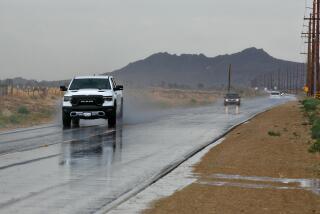Coldest Nights Were Always on Friday
- Share via
Fridays were the coldest nights of the week in Strathmore in the San Joaquin Valley. And it was on Fridays that the fog sat right on the ground, cutting visibility to your own mittened hand. At least, that’s the way my husband, Doug, remembered it. He grew up on an orange ranch outside Strathmore and, like the rest of the ranch kids, he helped with the grove work when he reached his teens.
On those cold nights when the radio farm reporter forecast weather below 32 degrees Fahrenheit, Doug knew it would be a night for lighting the smudge pots. The lighters ran from pot to pot between the trees, carrying lighted torches to ignite the fuel oil in the pots. They are black metal cylinders, centered with smokestacks and cone-shaped lids on top. They put out dense, oily smoke as well as heat to protect the trees and the fruit from freezing.
Doug said he remembered the coldest nights being Fridays because those were the nights of the Strathmore Union High School dances. The boys in their cords and letterman sweaters, if they had won them, and the girls in saddle shoes, gathered in the school gym to jitterbug.
During the evening, every half hour or so, a teacher would come out and grab the public address system mike and announce the temperature. When he said the temperature had dropped to the danger point, the boys stopped in mid-step and ran for their Windbreakers and cars. They tore down the country roads, the kids with cars, dropping their friends off at their home ranches or wherever they were working that night.
The girls called their fathers who had to pull on their cold-weather gear, get the car out of the barn or garage and go to school to pick up their abandoned daughters. Doug claims to remember winters when he didn’t hear “Good Night, Sweetheart” one time.
There is a temperature that will kill trees, not just destroy fruit, if it stays down there long enough. It splits the trunks, Doug said.
When Doug and I were first married, we lived in Whittier in the old Gunn house on Gunn Road, in the middle of 40 acres of oranges. We bought the old house because it had a 24-by-36-foot living room. Never mind the rudimentary bathroom, which had been pried into a former pantry, nor the electric wiring that swooped around the walls in great, unpredictable whorls. The living room had such grandeur, on entering it, I always wanted to kick my train.
The house stood 10 rows of trees back from Gunn Road and was surrounded by smudge pots. Even though Doug no longer was a member of that wild band of night fire bearers, we always listened to the fruit frost warnings. When the man on the radio said, “There will be firing on low ground tonight,” a chill ran up my spine and Doug, seated in his warm living room, shifted his feet like a man who should be up and doing, joining his fellows to save trees that were the valley’s fortune.
On those nights, we would wake up to the sound of men calling to each other down the rows of trees. Then we’d see them start down the rows with their torches, leaving a forest of flame-belching pots behind them. The smudge pots stood like shrines to an evil god who lived in the cold, clear, tree-killing sky. And in the morning, my white tie-back curtains hung gray and greasy at the windows.
The pots burned until their oil was gone, until just before dawn. There was a drama, an excitement about those nights as Doug had told me before. The bravery of men who were out there lighting their sad little stoves to heat up the whole sky to save their crops always seemed gallant to me.
They still use smudge pots in some places, although most of them have been replaced with wind machines. For some reason, it’s the still cold air that kills.
And our son, Tim, says that the big citrus ranchers in the Imperial Valley now use helicopters to keep the air moving.
The boys at Strathmore Union High School probably don’t have to leave their dates at the Friday night dance any more.
And something is gone. Those ranch kids don’t run the rows anymore, shaking their fists in defiance at the specters of winter that threatened their families’ packing house checks. Of course, it’s better. The curtains stay cleaner and the boys don’t breathe that dirty air. And they’ve lost something primal from their young lives.
More to Read
Sign up for Essential California
The most important California stories and recommendations in your inbox every morning.
You may occasionally receive promotional content from the Los Angeles Times.













